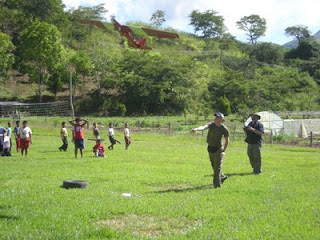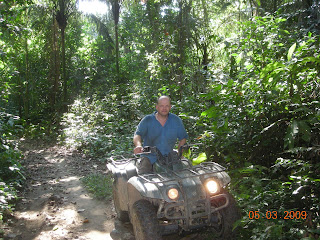
Today started like many days: with a schedule of events that I knew we wouldn’t be able to follow. First up was a trip to the very large housewares market. This place makes West Edmonton mall look like a strip mall! We were in the market for about 2 hours and didn’t see half of it. A number of the group bought machetes while others were busy looking for DVDs.
We had hoped to visit the street kids, but it was looking like we would not have the chance. Apparently, there has been some recent aggression towards the street kids from the authorities, so there was some resistance to having a bunch of strangers meeting with them. During our time at the market, however, Maria Jose called to say that the board of Plataforma had agreed to let us go with the street workers to meet with some of the kids. This caused a quick but worthwhile schedule shift, so we ate lunch at a very American food court in the local Cineplex. What made it better was that I knew where to buy popcorn. I practiced my Spanish in order to make sure I got the largest size and with salt, not sugar. Brent came with me, and, as I approached the counter and made my order, the young lady giggled a bit. (I assumed it was because of Brent). Then she said, “Yes, sir. I speak English.” In the end, we got a huge box of movie theater grade salted popcorn to share with everyone. I made brownie points with Corinne if no one else.
After lunch, we met Maria Jose at the Plataforma office for a tour, then split into two groups to go into the streets. This experience was influential for all to say the least, but, for me, observing the reactions to the experience was more interesting than the experience itself. And this is where the travelogue ends; I am going to write about my observation of Brent’s reaction--partly because he said I could and partly because he was my student at the College, and I have watched him grow over the last two years.
When I was about Brent’s age, a friend of mine took me to the movie Apocalypse Now at the U of C. I was not used to war movies. They were not something my parents encouraged me to watch. I didn’t even like scary movies or horror shows. I was a bit worried about how I would react to the gore and violence, but I was not about to wuss-out in front of my friends. There certainly is no shortage of gore, violence and despair in the movie. It was quite an introduction to war movies for me! Although it was on a movie, I was seeing things that I had never seen before. By the time the water buffalo butchering scene rolled around, there was something odd going on in my head. I came to the realization that the horror was not in the gore and the violence presented on the screen in front of me. The true horror, I realized, was that people lived through all that. The true horror was not in those who died, but in those who did not die, in those who had to come back from the war and try to live with those who would never understand. Don’t get me wrong, all the lives lost during the war was a horrible thing, but this was the first time in my life that I had to consider the possibility that surviving may not be the best outcome, and that possibility flew in the face of all I had been taught and all that I believed. That experience forever changed my thought process, and it was only a movie! I believe that part of the reason the movie had such an impact on me is that I had little or no exposure to anything like that growing up. I had not been gradually desensitized to violence and gore, so what I saw did not fit the rules that my brain worked from. I had to choose either to disregard the experience or to change the rules I functioned from. Although I experienced sensory overload, I chose to rewire my thinking instead of shutting down or denying the event. This type of thing has happened to most of us at some point in our lives; some event causes us to reevaluate our beliefs or position.
For Brent this trip was full of new sights and experiences. One does not get to see parrots flying overhead when splashing about in the Bow river. Every time you looked at Brent, he had a grin on his face that you couldn’t knock of with a 2x4! I spent a lot of time observing his reactions and was very impressed with his ability to avoid snap judgments and to remain opened-minded (or at least quiet) about events until he had a chance to process them a bit. As the trip went on, he became more open with us about his observations, and I appreciated his perspective. I anticipated his reaction to the street kids, and I don’t think I was far off. Even though he had spent 6 days with the boys at CERENID and even though he had heard the stories of where they came from, nothing truly prepares you for the experience of standing in the drainage ditch they call home. The details of his experience are for him to tell, and perhaps he will comment on this blog and tell his side of the story, but his reaction to the event tells volumes about him as a person.
My role as a teacher is to create an environment for students to learn, not to dish out facts to memorize nor opinions to persuade. In the classroom, I set outcomes for students to work towards but do not prescribe a path they must follow. Some like to read. Some like to write. Most like to do. How they get there is not as important to me as getting there. I tried to create learning opportunities on this trip, but unlike in the classroom, I did not even set specific outcomes other than stimulating the mind. I would even be pleased if someone came back with the opinion that we should not be interfering with the people of Bolivia as long as that opinion was formed on solid thinking from a more educated perspective.
When Brent came back from the street, I could see a look in his eyes that I last saw in a mirror a year ago, a look I saw in the eyes of many of my travel companions in Rwanda. It was the look that said, “I just don’t know how to process what I just experienced.” The rules that Brent had built his life on were not able to explain the events he just witnessed. When we talked later that evening, I sensed that he had a willingness to rewrite his rules. It won’t happen overnight; it took me the better part of eight months to come to grips with Rwanda, and I am still not all the way there. But, I believe, that this event will reshape Brent forever. It was his willingness to see, not just look, that made this experience a life changing one. He travelled not only with his eyes open but with his eyes WIDE open. He seemed to know intuitively what I believe to be true: “An experience does not need to be a good experience to be a worthwhile experience.”
I don’t know what will become of this experience for Brent, but I am very proud of him (and others in our group) for allowing himself to let this trip change him.














 We drove into Samipatia, the Banff of Bolivia, for a late lunch, some internet, the market and phone calls home. I posted a bunch of blogs, not easy when the interface is in Spanish, and I had to get my USB stick to interface with an antique computer. My we are spoiled!. we met in the park in the center of town were Jenna received a present from a bird above while relaxing on a bench, be careful where you sit!
We drove into Samipatia, the Banff of Bolivia, for a late lunch, some internet, the market and phone calls home. I posted a bunch of blogs, not easy when the interface is in Spanish, and I had to get my USB stick to interface with an antique computer. My we are spoiled!. we met in the park in the center of town were Jenna received a present from a bird above while relaxing on a bench, be careful where you sit!





















 One of the things I like best about Bolivia--though I am having a hard time getting used to it--is the two hour lunch. Zenon and his family were very hospitable and the food was amazing. There was no shortage of conversation albeit diverse and not what you would normally hear with company around the dining room table.
One of the things I like best about Bolivia--though I am having a hard time getting used to it--is the two hour lunch. Zenon and his family were very hospitable and the food was amazing. There was no shortage of conversation albeit diverse and not what you would normally hear with company around the dining room table. 








